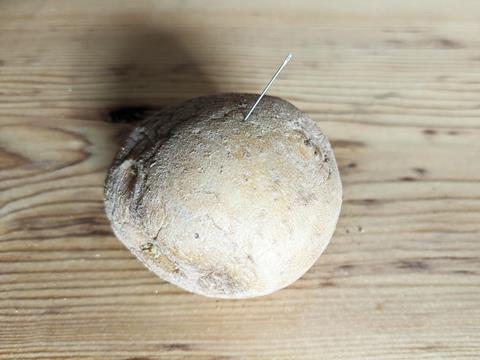Fortress Technology has designed an industrial-sized Bulk Potato Slider Detector System to detect metal contaminants in potatoes

The UK harvests 5.31 million tonnes of potatoes annually, worth £703m at farm gate, so ensuring crops are free of metal contaminants is essential to any thriving grower.
In the last decade, a number of crop processors, as an added safety precaution, have installed bulk metal detection systems after washing farmed produce and before packing into sacks.
Introducing this level of scrutiny is not unfounded. In October 2014, potato processors suffered a serious industry blow – product tampering. The discovery of needles in potatoes for one large international farmer resulted in a nationwide recall of nearly one million pounds of produce.
Although no sharp metal objects were detected in produce farmed by Fortress customers, one major potato processor took proactive steps to reassure their extensive supplier base and prevent an incident of this magnitude occurring. Their investment in three robust industrial-sized Fortress metal detectors continues to inspect 140,000 pounds of potatoes hourly.
This is not a drill
Without upstream inspection, a potato containing a needle could unknowingly be thinly sliced into crisps. The subsequent metal fragments may be too small for even the most sensitive downstream metal inspection systems to detect. For a market that’s worth over £2 billion annually, crisp producers are naturally eager to ensure their suppliers have robust inspection systems in place to help eliminate contaminants in root vegetables before processing.
As well as needles, drink cans casually discarded in crop fields, machinery nuts and bolts, or wire fencing blown down in a storm, can all be turned into the smallest metal fragments by powerful harvesters, cautions Fortress European managing director Phil Brown. These can easily disperse and embed contaminants into crops.
Addressing these fears directly, the prominent crop processor swiftly installed three industrial-sized Fortress Bulk Potato Slider Detector Systems. To this day, they continue to play an important role in guaranteeing high standards across the potato supply chain and provide valuable assurance to major retailers.
Machines with grit
When creating the robust design, Fortress was mindful that potatoes have a number of product attributes that could affect the accuracy of the metal detectors. “Potatoes are typically washed and wet. They are neither super clean or dry, and they come in all different sizes,” says Brown. These factors can impact a metal detector’s ability to distinguish between the potatoes and any metal contaminants introduced, leading to false signals and consequently wasted produce.
To ensure the potatoes were run at the highest performance level, Fortress engineered a special VLF (very low frequency) coil. This allows all potatoes to appear as dry products on the machine, essentially ignoring the product effect caused by soil, grit and moisture.
Another essential feature designed for harsh, rigorous production environments is the BSH rugged casing. This helps to provide better stability and metal detector performance for when rolling potatoes collide with the sides of the system as they are funnelled down the conveyor.
On a roll
Orientation effect, especially when trying to detect long, thin needles, was another added challenge Fortress resolved. Typically, these contaminants will be embedded within the potato or root vegetable. Detecting any fragments will depend entirely on the direction that a bouncing potato is passing through the metal detector. In one orientation, the signal for the needle may be huge. But if turned 90 degrees, the needle may pass through the metal detector’s electromagnetic field undetected with little to no disturbance.
To combat this, Fortress engineered the metal detector with a rolling-system rather than traditional belt. It provides a stronger signal than stagnant objects. “The potatoes roll through the metal detector to limit the chance that a needle misses detection due to orientation effect,” explains Brown. The technique worked remarkably well in all test cases, with the customised metal detection unit reporting minimal false positives and superior accuracy and metal detection sensitivity.
Warehouse floorspace and how the reject system could align with other design features were also carefully addressed. “Space on farms is often tight,” says Brown. ”Products also roll through at fast speeds, making it challenging to account for the placement of potatoes as they pass through the metal detectors. The benefit of our roll-through design is there is no belt. Instead, a flap expels contaminated product to the reject area below.”
A simple conveyor with a low-maintenance UHMW slider bed was integrated alongside the farmers existing cleaning and grading systems, resulting in an optimised and cost-effective solution.
Globally, farmers face multiple challenges every year, from floods and droughts to poor harvests, fluctuating energy costs and crop damage. “Although product tampering is extremely rare, in the last decade Fortress has observed a large uplift in enquiries from root vegetable and potato farmers and bulk processors for robust gravity and conveyor metal detection systems,” says Brown. ”These can help to prevent future adulteration and contamination events from causing potentially catastrophic damage to brand reputations.”



